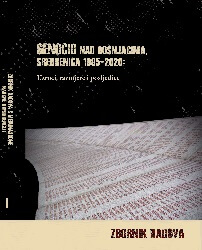Posttraumatska i dehumanizacijska dimenzija srebreničke boli
Posttraumatic and Dehumanization Dimension of Srebrenica Pain
Author(s): Srđan Vukadinović
Subject(s): Local History / Microhistory, International relations/trade, Studies in violence and power, Victimology, Transformation Period (1990 - 2010)
Published by: Institut za istraživanje zločina protiv čovječnosti i međunarodnog prava Univerziteta u Sarajevu
Keywords: Posttraumatic Dimension; Dehumanization Dimension; Srebrenica Pain; Universal Values; Justice; Failure;
Summary/Abstract: The doctrine of the Srebrenica genocide is a painful example for humanity that will forever serve as a warning wound to the world towards this, once, protected zone of the United Nations. One of the two great-power projects, which had a devastating effect on the South Slavic area, and which is the creator and performer of the Srebrenica pain, is basically deeply anticivilization and dehumanizing. Genocide in Srebrenica happened in spite of everything the international community, whatever they meant by that phenomenon, knew about the project and its actors. Especially since certain international values occurred and formed after the Second World War, it has been shown that an international arbiter is possible who can prevent the occurrence of genocidal intentions. The Srebrenica experience is astonishing in the heart of Europe, which has done almost nothing to prevent it from happening. And twenty-five years after him, he is just as unsuccessfully working to regain life in something that should be the eternal wound of the international community. Most responsible address as to why the Srebrenica genocide took place is the international one. And no “washing” of the unclean and dishonest conscience of international officials is and cannot be effective. And two and a half decades later, the same address bears the sole responsibility that everything that erases the memory of this monstrous act is erased, that crimes are kept silent, that convicted war criminals are glorified in certain parliaments that are bearers or those who were mere supporters of the mentioned projects. Such a sense of injustice, under the auspices of the international community, is stifling Srebrenica society, and thus Bosnia and Herzegovina and South Slavic. Political groups, power and, finally, the human nature of the universal code are to blame for everything that is happening in Srebrenica after two and a half decades. It is well known that often times large-scale media manipulations cause smart and determined individuals, as well as highly developed social and moral consciousness, to sink. That is not why justice should be done. There is no justice in the face of crime. And he may have an understanding. The only elementary justice that anyone who has committed a crime can try to establish is: first to realize that he did it, second to be sorry for what he did, third to repent for what he did, fourth to admit that he did it and fifth to finally bear all the consequences of every possible justice for what he has done. However, Srebrenica carries one dimension that is much larger than what is called a mass crime. It carries a postgenocidal dimension. The greatest sacrifice made by an innocent man in relation to his ethnic, religious or racial affiliation should carry planetary condemnation. If, even twenty-five years after the crime, there is no such condemnation, based on universal values, but many things are covered with a veil of oblivion, remembrance and non-confrontation, then it is a warning example for society and the international community, which is just as dehumanizing. And anticivilization, as much as the project that produced it.
- Page Range: 819-831
- Page Count: 13
- Publication Year: 2021
- Language: Bosnian
- Content File-PDF

